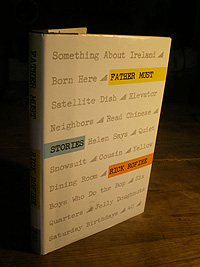
Rediscovered Reading is a new regular series in which Matt Briggs reviews overlooked collections of short fiction. Matt is the author of Shoot the Buffalo and other books. He blogs at mattbriggs.wordpress.com.
Farrar Straus and Giroux published Rick Rofihe’s great collection of stories Father Must in 1991. Nine of the stories in the collection had appeared in the New Yorker during the waning days of minimalism in the late eighties. Rofihe’s collection, it seems, has never been issued in paper but acceptable hardback copies can be found for about two bucks plus shipping and handling.
A profile in the Downtown Express in 2005 mentioned that Rofihe was born in Bridgewater Nova Scotia in 1950, a small town without a bookstore or library. Rofihe has never taken a writing class, and yet his writing resembles the academic house style of the eighties, minimalism on first glance. But, after reading one story and then another, it becomes clear that the only structural similarity is that the Rofihe is very interested in sentences. His stories are mostly about the sentences people say to one another. Generally, they are private things with obscure meanings. In “Helen Says,” the word is “masking.” Helen defines the word: “Think of a glove. One that dulls your sense of touch, but as if it were worn underneath the surface of your hand.”
While Rofihe’s style concentrates just as much on the surface quality of the writing, his style omits the gaps, jumps, repetition, and the control over incidental imagery in a book such as the Raymond Carver written and Gordon Lish edited, What We Talk About When We Talk About Love. Die-hard minimalists seemed to prefer the pronoun to the proper noun and avoided adverbs or colorful verbs. No one came lolloping up the hill in a minimalist story. In contrast, Rofihe’s language is specific and evokes the words used by his characters. From the first page of Father Must:
Enid is in her room putting on makeup. Why do anything to those delicate features? “Because it takes up time,” she would say if asked.
Rofihe’s portrays the private language we use in living our lives. Joan Didion has her aphorism, “We tell our stories in order to live.” In a sense then Rofihe is showing us the sentences we tell ourselves in order to live. His method is a direct way of handling it. The words are the images telling the story. In “Boys Who do the Bop:”
Learning to type? Not easy, right?
It is work which gives flavor to life.
It is work which gives flavor to life.
It is work which gives flavor to life.
And the story proceeds to move between the words that the characters tell themselves about their lives and how these words that they are telling them affect their lives. Another story, “Six Quarters” turns on a joke made by the narrator’s grandfather about the difference between American quarts and imperial quarts. A quart is a quarter of a gallon, but an imperial quart is larger than an American quart so that a there about five imperial quarts to a gallon. Five quarters the grandfather says, and then later the narrator raises him a quarter to six quarters.
One of my favorite stories in the collection is a vignette called “Snowsuit.” In this piece, a woman observes an eight-year-old boy laying in the snow in his front yard. The boy sits in the snow. He doesn’t move. Finally, the woman crosses the street to find out if he is okay and then when he is okay, she wants to find out what he is doing in the snow. He is just sitting there with his thoughts. She is bothered by this. He has thoughts, and these thoughts are not represented in the story and they are inaccessible to the woman. If the boy was doing something, she could understand him. Character is action and all of that. Can’t a person just sit and think? A person isn’t just action. A character is also a boy sitting in a snowfield in a warm snowsuit starting at a monochrome sky.
-
1
Pingback on May 24th, 2009 at 10:10 am
[…] at Fictionaut’s Blog in a column called “Rediscovered Reading.” The first book I look at is 1991’s great collection by Rick Rofihe, Father Must. I have a half dozen books that fit […]
-
2
Pingback on Dec 21st, 2009 at 2:27 pm
[…] at all, collection such as Dawn Rafel’s The Year of Long Division and Rick Rofhie’s Father Must, I had been gradually subsumed by this […]

May 24th, 2009 at 11:01 am
This is a great idea for a column, and an excellent post to get it started. I’m looking forward to reading more.
May 24th, 2009 at 11:12 am
RR’s style is so authentically original and idiosynchratic, it is a reminder that being easily accessible is not fictions greatest virtue. He makes it new.
Jul 30th, 2009 at 8:55 pm
I agree – excellent review! I just read Rofihe’s story “Australia” over at Slush Pile, and this review really illuminates what I liked about that story too.
Thanks!
Aug 19th, 2010 at 11:26 am
I feel inspired to pick a book by the author after reading the review. i just hope reviewer did not hard sell.